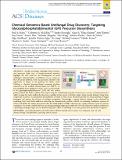Chemical Genomics-Based Antifungal Drug Discovery: Targeting Glycosylphosphatidylinositol (GPI) Precursor Biosynthesis
Author(s)
Mann, Paul A.; Koseoglu, Sandra; Si, Qian; Kuzmin, Elena; Flattery, Amy; Harris, Guy; Sher, Xinwei; Murgolo, Nicholas; Wang, Hao; Devito, Kristine; de Pedro, Nuria; Genilloud, Olga; Kahn, Jennifer Nielsen; Jiang, Bo; Costanzo, Michael; Boone, Charlie; Garlisi, Charles G.; Roemer, Terry; McLellan, Catherine; Lindquist, Susan; ... Show more Show less
DownloadLindquist_Chemical genomics.pdf (4.594Mb)
PUBLISHER_POLICY
Publisher Policy
Article is made available in accordance with the publisher's policy and may be subject to US copyright law. Please refer to the publisher's site for terms of use.
Terms of use
Metadata
Show full item recordAbstract
Steadily increasing antifungal drug resistance and persistent high rates of fungal-associated mortality highlight the dire need for the development of novel antifungals. Characterization of inhibitors of one enzyme in the GPI anchor pathway, Gwt1, has generated interest in the exploration of targets in this pathway for further study. Utilizing a chemical genomics-based screening platform referred to as the Candida albicans fitness test (CaFT), we have identified novel inhibitors of Gwt1 and a second enzyme in the glycosylphosphatidylinositol (GPI) cell wall anchor pathway, Mcd4. We further validate these targets using the model fungal organism Saccharomyces cerevisiae and demonstrate the utility of using the facile toolbox that has been compiled in this species to further explore target specific biology. Using these compounds as probes, we demonstrate that inhibition of Mcd4 as well as Gwt1 blocks the growth of a broad spectrum of fungal pathogens and exposes key elicitors of pathogen recognition. Interestingly, a strong chemical synergy is also observed by combining Gwt1 and Mcd4 inhibitors, mirroring the demonstrated synthetic lethality of combining conditional mutants of GWT1 and MCD4. We further demonstrate that the Mcd4 inhibitor M720 is efficacious in a murine infection model of systemic candidiasis. Our results establish Mcd4 as a promising antifungal target and confirm the GPI cell wall anchor synthesis pathway as a promising antifungal target area by demonstrating that effects of inhibiting it are more general than previously recognized.
Date issued
2014-12Department
Massachusetts Institute of Technology. Department of Biology; Whitehead Institute for Biomedical ResearchJournal
ACS Infectious Diseases
Publisher
American Chemical Society (ACS)
Citation
Mann, Paul A. et al. “Chemical Genomics-Based Antifungal Drug Discovery: Targeting Glycosylphosphatidylinositol (GPI) Precursor Biosynthesis.” ACS Infectious Diseases 1.1 (2015): 59–72. © 2014 American Chemical Society
Version: Final published version
ISSN
2373-8227